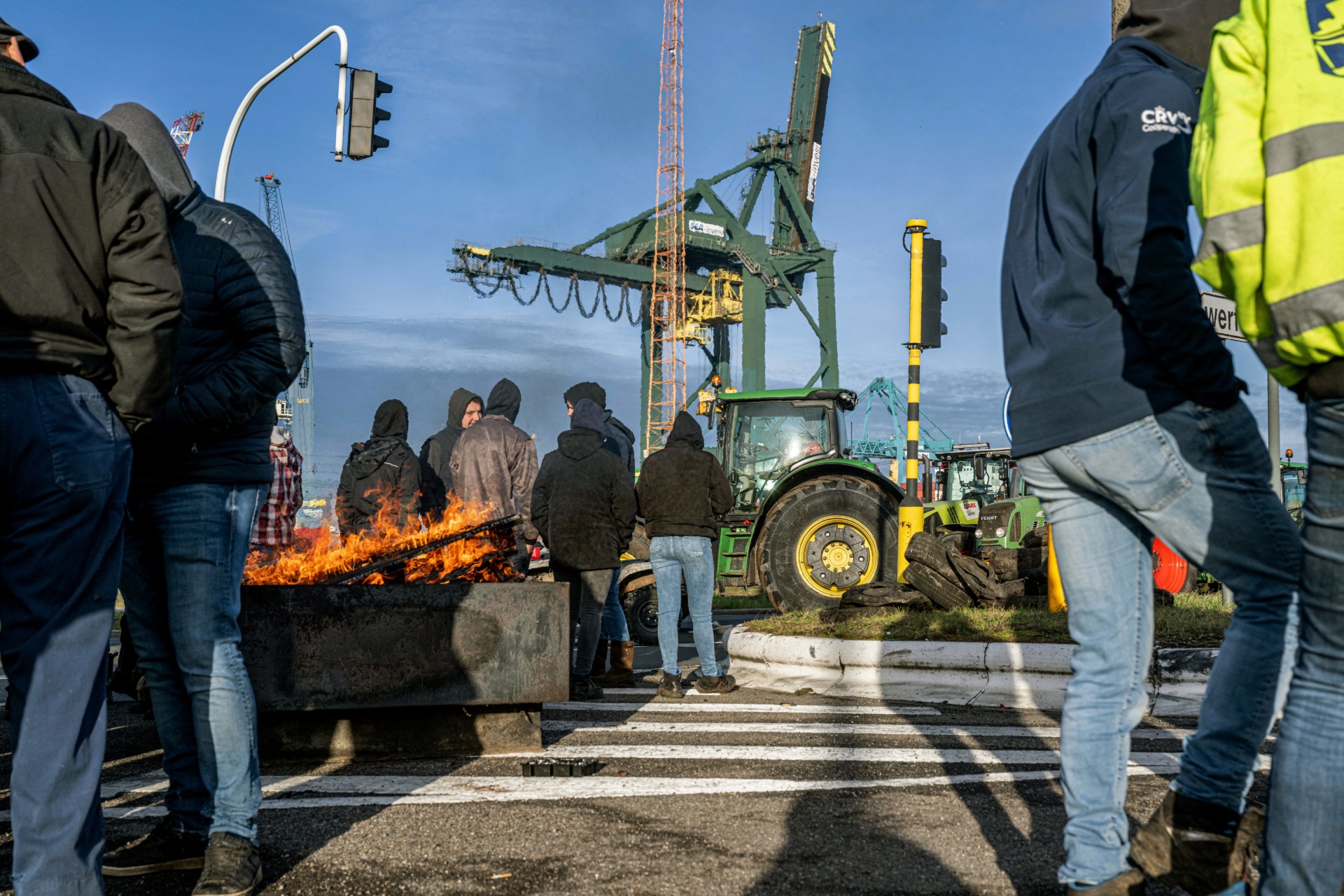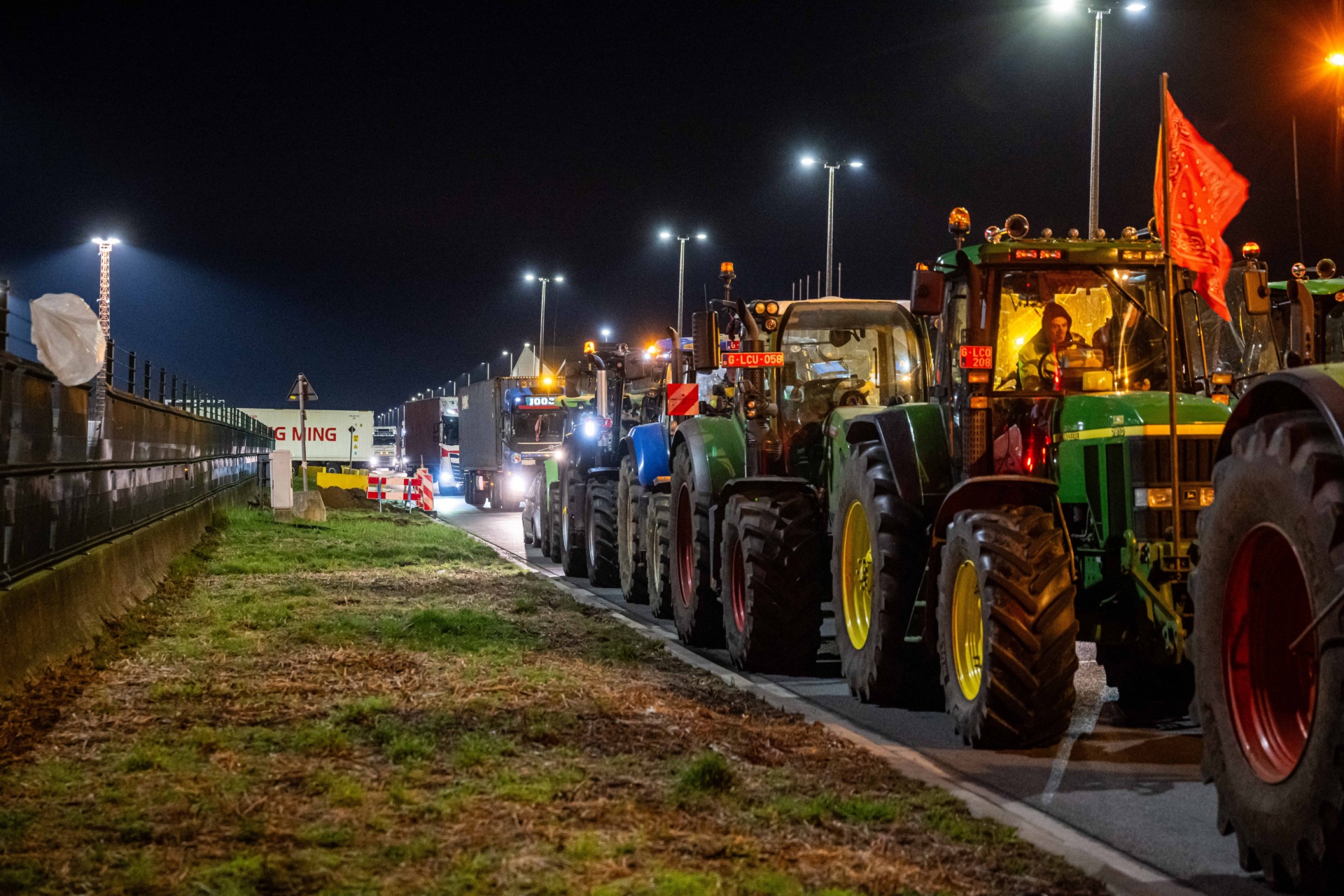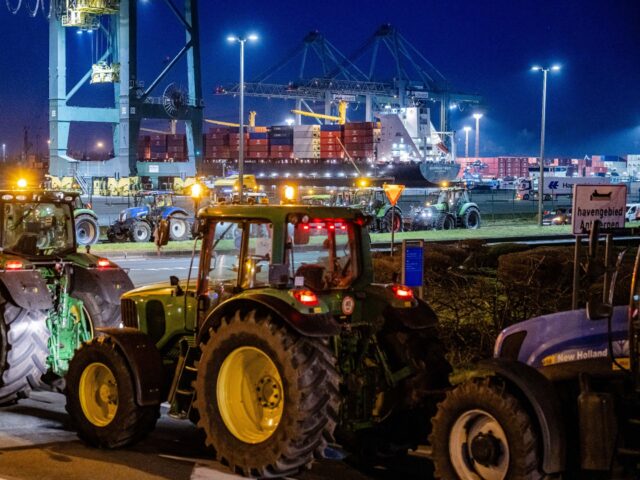Hundreds of tractors blockaded the Port of Antwerp in Belgium on Tuesday as farmers continue their fight against the green agenda and free trade policies of Brussels ahead of the European Parliament elections.
Business at Europe’s second-largest seaport was serverly impacted as around 500 tractors blocked off access on the roads surrounding the Port of Antwerp in northern Belgium to protest the environmental and agricultural policies imposed on them by their own government and Eurocrats thirty miles to the south in Brussels.
The protest forced the leader of the local Flemish government, Jan Jambon, to cancels his scheduled trip to Barcelona to try to come to a deal with the farmers. Speaking ahead of the protest, Jambon said per Dutch public broadcaster NOS: “I don’t think anyone would like to see the blockade of the port of Antwerp happen, but it is up to everyone to take their own responsibility. I hope that people will be reasonable tomorrow. ”
On Tuesday, Flemish Minister for the Environment Zuhal Demir offered to meet with a delegation of farmers from the Antwerp protest, saying that they would have a police escort to meet with her in Brussels. However, the farmers, many of whom appear intent to continue their blockade of the port overnight, scoffed at the offer, arguing that if she felt the issue was so important, she could come to them, the Antwerp-based Het Laatste Nieuws reports.
Although the blockade of the port comes amid a wider struggle of farmers across Europe, who have faced increasing difficulty amid rampant inflation, the mass importation of cheap Ukrainian agricultural products, and the EU’s green agenda, the latest protest in Antwerp came in response to the Flemish government’s latest decree on nitrogen, demanding that they are cut in half by the end of the decade in order to comply with European Union standards.
Farmers have argued that the decree disproportionately impacts them, while giving carveouts to big business. Speaking to the Gazet van Antwerpen a group of farmers said: “First of all, industry is allowed to emit forty times more than farmers. We are also accused of producing for export. But what about companies like Ineos here in the port of Antwerp, or Volvo Cars? Don’t they also export?”

Farmers stand beside tractors and a fire, during a protest organized by several agricultural unions at quai 730 near the port of Antwerp on February 13, 2024. (Photo by JONAS ROOSENS / Belga / AFP) / Belgium OUT (Photo by JONAS ROOSENS/Belga/AFP via Getty Images)
“This protest comes from below. This time the initiative comes from the farmers themselves. It is mainly us, young farmers, who see our future melting away before our eyes. That is the life’s work of sometimes several generations in the family,” they continued.
“We will remain here until we receive a clear signal from politicians that something is changing. We are prepared for it. We receive a lot of food from bakers, butchers and partners to whom we supply. That gives us the feeling that many people are behind us.”
The broad support for farmers against the climate change-inspired regulations and taxes has sparked fear among globalist governments throughout Europe and even the EU leadership in Brussels announced that it would be walking back several elements of its Net Zero plans in an attempt to quell the anger of the farmers.
However, with around 400 million people set to head to the polls in June to decide the makeup of the next European Parliament, farming groups appear intent to keep the pressure up to ensure that agriculture remains at the top of mind for voters. Arnaud Rousseau, the head of the FNSEA agricultural union in France, said this week that it is “very probable” that farmers in France will once again take to their tractors to demand better treatment.

Farmers and their tractors gather for a protest action near quai 730 in the port of Antwerp, organized by several agriculture unions, Tuesday 13 February 2024 in Antwerp. Farmers’ protest across Europe as they demand better conditions to grow, produce and maintain a proper income. BELGA PHOTO JONAS ROOSENS (Photo by JONAS ROOSENS / BELGA MAG / Belga via AFP) (Photo by JONAS ROOSENS/BELGA MAG/AFP via Getty Images)
Collective action from farmers have already seen political success, such as the tractor protest Farmer Citizen Movement party, which became the largest party in the Dutch senate last year and is likely to be a coalition partner of the presumptive prime minister, populist leader Geert Wilders, who has been a staunch supporter of farmers.
Populists throughout Europe have begun to allign themselves their cause, with Italian Deputy Prime Minister Matteo Salvini casting the election as a battle between the climate agenda of elites like European Commission President Ursula von der Leyen against working class farmers.“The Von der Leyen commission is disastrous in relation to labour and rights,” Salvini said while in Brussels earlier this month, adding that the objections of the farmers “are with the crazy, pseudo-green European policies that regard farmers, fishers, truck drivers…it is clear that this Europe has put ideology ahead of labour.”

COMMENTS
Please let us know if you're having issues with commenting.